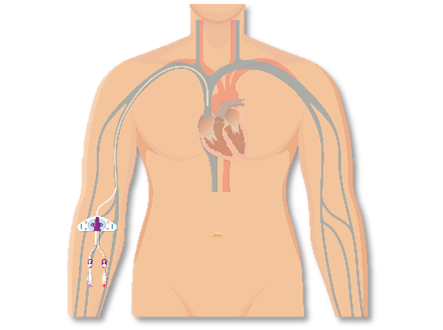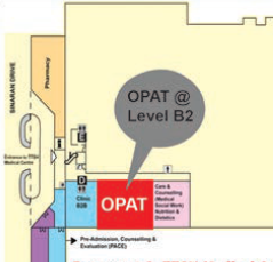Download English Brochure (1.1 MB, PDF)
Download Mandarin Brochure (806 KB, PDF)
Download Malay Brochure (1.3 MB, PDF)
Download Tamil Brochure (761 KB, PDF)
What is OPAT?
Outpatient Parenteral Antibiotic Therapy (OPAT) allows you to continue your course of intravenous antibiotic treatment prescribed by your doctor, either in Tan Tock Seng Hospital's OPAT clinic or in your own home.
OPAT clinic offers you the opportunity to complete your antibiotic treatment safely and conveniently without staying in the hospital overnight.
What to Expect Before Your OPAT Treatment?
- A doctor's referral to OPAT
- Assessment by an OPAT doctor on your suitability for the treatment. The options for treatment are listed below:
- Clinic OPAT
- Home OPAT
- Caregiver OPAT
- If you are a suitable candidate, an OPAT nurse will proceed to advise you on important information related to your treatment, such as treatment charges, Medisave claims, follow-up visits and more.
What Will You Need for Your OPAT Treatment?
-
Cannula to administer treatment; OR
-
Peripherally Inserted Central Catheter (PICC): A special tubing that is inserted through a vein in your arm. Treatment using a PICC reduces the risk of infection as compared to using an intravenous cannula insertion.

Peripherally Inserted Central Catheter (PICC)
-
Antibiotics: Your antibiotic prescription will be specially prepared for administration via the PICC. During treatment, you are free to resume your normal routine.
-
Hospitalisation leave: You will be issued hospitalisation leave during the course of your treatment.
What are the Potential Risks and Their Preventive Measures?
The risks you may experience are:
-
The infection you are being treated for may deteriorate during the course of your OPAT treatment.
-
Management
- You may be re-admitted to the hospital for further management, if necessary.
- You may develop rashes, nausea or diarrhoea from the antibiotics administered.
-
Management
- You may require a change of antibiotics or re-admission to the hospital
- The first dose of your antibiotics will be administered in the hospital. This is to ensure that there are no serious side effects
- A weekly blood test will be taken to monitor for any side effects affecting your blood count, kidney or liver function, and to assess your response to the antibiotic treatment.
- Your PICC may become clogged, infected or dislodged.
-
Management
- A radiology specialist will assist to clear the blockage.
- For early detection of possible infection, PICC sites will be inspected each time you visit.
How Often Do I Need to Return for Check-ups?
- Your OPAT nurse will arrange appointments for you to return for your regular reviews depending on the antibiotics prescribed. This usually happens on a daily/ alternate-day/ weekly basis and includes weekends and public holidays.
- The doctor will also see you every week or when the nurse detects a possible problem.
What Happens After I Complete My OPAT Treatment?
- An appointment will be arranged for you to see either your doctor who referred you to OPAT or an Infectious Disease Specialist for follow-ups.
- You may also be required to undergo blood tests and ultrasound scans, and be given oral antibiotics when you return for review.
Can I Use My Medisave to Pay for OPAT Treatments?
- Yes, you may use your Medisave to pay for certain OPAT treatment charges. This is subjected to an annual cap established by the Ministry of Health and any other applicable regulations.
- You may check with the OPAT nurse if you have any enquiries.
If you have any problem with your treatment, please contact your doctor, pharmacist or nurse clinician.
Where are We Located?
TTSH Medical Centre, Basement 2

